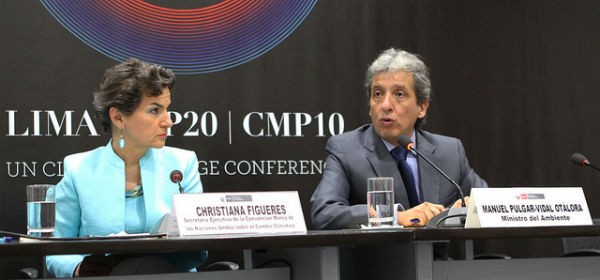(VOVworld) – The 20th UN Climate Change Conference, COP-20, is taking place in Peru’s capital city Lima. Representatives of 200 countries are attending the conference to discuss ways to reduce carbon emissions and deal with the effects of climate change. The conference hopes to create an international agreement and an action plan for each country.
 |
Christiana Figueres and Peru’s Environment Minister, Manuel Pulgar-Vidal in a dialogue prior to COP-20 in Lima, Peru (photo: COP20.pe)
|
COP-20, from December 1-12, is the last UN Climate Change Conference before the deadline set for countries to sign a new agreement to replace the Kyoto Protocol.
Representatives from member countries and territories of the UN Framework on Climate Change (UNFCC) will focus on a new UN-backed global agreement to limit global warming to less than 2 degrees Celsius above the pre-industrial average and protect the environment against further damage by human activity.
Challenges
Prior to the Conference, Peruvian Minister of Environment Mauel Pulgar-Vida said it’s hard to expect a breakthrough at COP-20, but countries can take steps toward signing an agreement next year.
He made the comment based on the fact that industrialized countries have not achieved the target set in the Kyoto Protocol of reducing carbon emissions 7 to 8% by 2012, using 1990 as a baseline. The main problem is that countries have different interests and responsibilities. Developing countries expect developed countries to take more responsibility for reducing carbon emissions. Developed countries say emerging economies must share the responsibility. Figures show that China and India are major CO2 producers along with the US and the EU. Countries have not agreed on funding to help poor countries cope with global warming. Developing countries want rich countries to keep their promise to increase the Climate Protection Fund from 10 billion USD in 2010-2012 to 100 billion USD in 2020. Because of the global financial crisis, developed countries have hesitated to make any long-term commitment.
Although leaders have not totally fulfilled their commitments, scientists are warning that delaying emissions cut will have serious consequences in the next 15 years, including sea level rise, ice melt, drought, and extreme weather. A study by the US National Oceanic and Atmospheric Administration shows that 2014 has been the hottest year since record keeping began more than 130 years ago. The average global temperature between January and October was 0.68 DC higher than the 20th century's average global temperature of 14.1 DC. 33 of the 38 glaciers have melted down. Carbon dioxide emissions, the main contributor to global warming, rose to a record high of 40 billion tons in 2014. The Global Carbon Project report released prior to COP-20 says that in the next 2 decades emissions will surpass the threshold for the world to keep global warming to less than 2 DC.
Fragile rays of hope
Despite the unlikelihood of reaching a global agreement, some positive signs appeared prior to COP-20. The Green Climate Fund said its 22 member countries promised to donate 9.6 billion USD to help developing countries cut emissions and adapt to climate change. The US, the biggest donor, promised 3 billion USD and Japan agreed to contribute 1.5 billion USD.
In mid-November US President Barack Obama and Chinese President Xi Jinping announced in Beijing an agreement on emission cuts by 2030. The US will cut emissions 28% by 2025 using 2005 as a baseline. China announced its intent to peak carbon dioxide emissions by 2030 and gradually reduce emissions in later years.
UN Secretary General Ban Ki-moon said climate change is a contemporary issue which requires urgent resolution. The longer the delay, the higher the price humanity will have to pay, he said. Christiana Figueres, Executive Secretary of the UN. Framework Convention on Climate Change, said COP-20 outcomes will be an important basis for the world to turn potential into reality. Peruvian Minister of Environment Mauel Pulgar-Vidal said COP-20 in Lima is an important opportunity to obtain climate change agreement for 2015. The public is waiting to see if their leaders will take responsibility for the future of our earth.